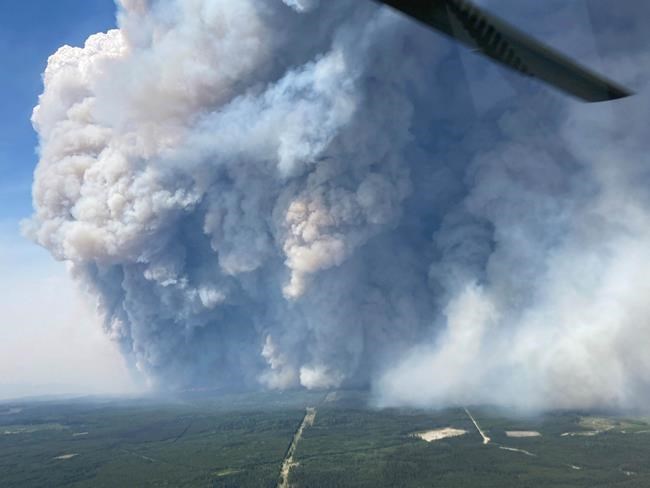Storms across the country could bring much needed rain, but meteorologists say it's not enough to extinguish the danger as Canada experiences its worst wildfire season of the 21st century.
"Unfortunately, we are not expecting to see enough precipitation to make a huge effect on this situation at this time, especially with how dry it is," said Sara Hoffman, a meteorologist with Environment and Climate Change Canada.
"But again, any rain is appreciated and definitely helps."
There were 447 active fires in Canada on Tuesday afternoon, with 226 listed as out of control.
Quebec's public security minister said a rainy forecast in that province was bringing hope for progress in battling the blazes, as more than 7,200 people remained out of their homes due to fires.
François Bonnardel said the fire effort was bolstered by the arrival this week of two contingents of American firefighters, with more reinforcements from Spain and Portugal expected to arrive Wednesday.
Rain is also in the forecast for a large portion of Western Canada, but along with it thunderstorms and a risk of lightning. About 14,000 people remained out of their homes in Alberta.
"I know things are starting to improve in many places across the country," Prime Minister Justin Trudeau said in Ottawa.
"There’s lots of Canadians still struggling. Lots of families and communities still affected by it.”
Dropping temperatures and rain could help quench an out-of-control fire that continues to pose a danger to the community of Edson, Alta., west of Edmonton.
Christine Beveridge, the town's chief administrative officer, said they are hopeful with cooler temperatures and some precipitation forecast for the area in the coming days.
The 2,042-square-kilometre fire remains 1.5 kilometres from the community, and its 8,400 residents remain under an evacuation order.
The changing weather is also expected to move wildfire smoke back over southern portions of the Prairies, especially in Alberta, as the week progresses.
Elsewhere, a storm is forecast to move into northeastern British Columbia, where officials describe a "volatile and rapidly evolving" wildfire situation.
Environment Canada said a system could dump up to 25 millimetres of rain over the parched Peace River region, but would likely be followed by thunderstorms and winds gusting to 60 km/h.
Hundreds of people are out of their homes or under an evacuation alert as the 4,800-square-kilometre blaze continues to burn. The fire doubled in size over the last eight days, becoming the second largest wildfire in B.C. history.
The same weather system prompted severe thunderstorm watches for a large part of southeastern B.C., a wind warning for the west side of Vancouver Island and special weather statements for most other central and southern regions.
That includes the eastern Vancouver Island area, where a small but aggressive fire burned out of control on steep hills above Highway 4, closing the only paved link to Port Alberni, Tofino and Ucluelet.
Officials said the key highway would remain shut for at least another 10 days and may not be fully open until mid-July.
Meanwhile, relief swept over the East Coast as a record wildfire was finally under control, more than two weeks after an unprecedented string of fires broke out in the southwestern corner of the province and the Halifax area.
The huge fire in Shelburne County became the largest wildfire in the province's history after growing to more than 235 square kilometres.
The province's Department of Natural Resources said firefighting crews were still on the ground walking through the area, kicking over rocks and examining stumps. Two helicopters were also to fly over the area, sending back records of high heat areas from their sensors.
Spokesman Dave Steeves said it is monotonous work but vital to avoiding the ongoing fire threat.
Nova Scotia also lifted a provincewide burn ban that was put in place at the end of May after a wildfire started in the suburbs north of Halifax, forcing 16,000 people to flee and destroying 151 homes and dozens of other structures.
About 5,000 firefighting personnel from multiple countries have been deployed across Canada to help battle the flames, and hundreds more are expected to arrive from Chile, Costa Rica, Spain and Portugal in the coming days.
This report by The Canadian Press was first published June 13, 2023.
The Canadian Press

